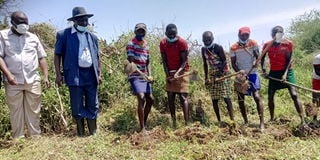Initiatives seek to turn Kerio Valley into a food-secure region

National Irrigation Authority CEO James Odiuwor and Christian Impact Mission Director Bishop Titus Masika (in blue suit), with Pokot reformed warriors in Tiaty, Baringo County.
What you need to know:
- Called Operation Tpu Kle Out, which refers to ending dependence on relief food, the programme has seen tremendous success in its five years of existence, with communities in the Kerio Valley, once rated among the poorest in Kenya, practising it.
- The model works on the principle that the size of acreage of land depends on the depth and volume of water you have, and managing the land using minimum water but getting maximum production.
The Kerio Valley has often hit the headlines for the wrong reasons, with rampant insecurity caused by bandits.
But the region is now slowly adopting farming and reformed warriors are turning over a new leaf.
They practise farming on quarter-acre plots, in what is expected to help improve food security in the region and make local communities more self-sufficient.
Called the Adopt a Village initiative, the model works on the principle that the size of acreage of land depends on the depth and volume of water you have, and managing the land using minimum water but getting maximum production.
Under the initiative, leaders, donors and well-wishers adopt villages and support farmers engaging in farming.
The model is being practised in Tiaty, Baringo County, and Lomut in West Pokot County.
It seeks to boost food security and improve economic development in the semi-arid area.
This approach was adopted five years ago in Yatta, Machakos County, which had suffered lack of water and hunger.
It is turning out to be a sustainable way of making communities self-reliant.
Commercial villages
In the Kerio Valley and Yatta areas, more than 50 commercial villages have been established.
Christian Impact Mission (CIM), which fights hunger, is a key player in the Kerio Valley programme, employing a series of participatory approaches to motivate residents at the household level.
It helps them identify their needs and come up with solutions.
The concept requires every house to have a water pan.
To achieve rich harvests, farmers dig two-square-foot trenches, known as silanka.
They fill the bottom foot with farm waste, which helps to hold water when it rains or during irrigation, while the upper foot is filled with soil mixed with manure.
Operation Tpu Kle Out
Called Operation Tpu Kle Out, which refers to ending dependence on relief food, the programme has seen tremendous success in its five years of existence, with communities in the Kerio Valley, once rated among the poorest in Kenya, practising it.
Ideally, half an acre can hold up to 400 silankas, which yield a maximum of 16 bags of maize per season.
Mr Samuel Losilikol, 43, a farmer from Lomut, said that initially there was neither water nor food but now they can get enough food to eat and even a surplus to sell.
“Five years ago, poverty was widespread in this area because the harsh conditions could not allow us to farm. We could barely make ends meet,” he said.
Ms Evelyn Pkemei, a farmer in Ng’oron village, Baringo County, says residents have started benefiting from the project.
“This project works and we need to invest heavily in it,” she said.
Friendly farming
CIM director Bishop Titus Masika says farmers practise ecological farming, which is friendly to changing weather patterns and is safe for the environment.
“Tpu Kle was the talk of the region. ‘Operation Tpu Kle Out’ was my passion for the Pokot people,” he said.
Bishop Masika said that they are ready to promote the ‘Adopt a Village initiative in semi-arid areas, noting that the model will help regions without rainfall become food-sufficient so that residents don’t rely on relief food from the government and donors.
“Banditry and cattle rustling will be a thing of the past. There will be plenty of food,” he said.
He says that the system has improved crop yields and saved many lives.
“We use reservoirs to harvest water,” he said.
“The training involves both theory and practical work where residents are invited to the Yatta Transformational Centre to attend a four-hour session for a week in a tutorial workshop. The rest is applied on their respective farms,” he said.

CIM Director Bishop Titus Masika (in blue suit) with agriculture community mobilizers in Tiaty, Baringo County.
Bishop Masika has challenged the government to take up the initiative and shun handouts so that residents can be self-reliant.
“We want people who are self-reliant. We want to be self-donors. NGOs are going home because of corona,” he said.
He said young people in the region need transformation and should be engaged in development initiatives.
He called on residents to embrace agriculture.
“What we need is political goodwill. If the initiative is working in Baringo and West Pokot, it can happen in the whole country,” he said.
He noted that leaders in the North Rift region need to come together and support the initiative.
“We started with two villages. Now we have 52 commercial villages in Yatta,” he said, noting that the aim is to increase food production, make the target regions secure and improve the quality of life of residents.
He expressed confidence that the initiative will help people in semi-arid areas shun relief food and avert hunger, emphasising the need to improve education and the economy in the Kerio Valley.
“We call upon politicians and religious leaders to take up the initiative. We need it taken to the grassroots to help improve the lives of residents,” he said.
He says this model has been applied by World Vision in Tanzania, Malawi, Congo, Sudan, Ethiopia and Uganda.
“This is a water-deficit area and we started water harvesting in 2009. We had 1,300 small dams and this was the game changer, a revolution where water is used to supplement rains,” he said.





